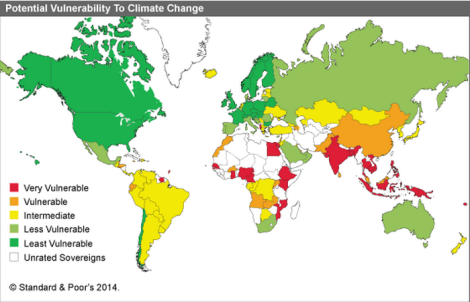Last week, Ezra Klein declared us all toast in his Vox blog post “7 reasons America will fail on climate change.” He said that America had neither the will nor the way to do what’s required to stave off the worst of climate change’s threats. The key line in that piece for me was “This is climate change’s ugliest tradeoff: It pits our most fundamental economic goal against our core environmental imperative.” We’re too big to succeed, in other words, and we’re only really concerned right now with getting bigger.
America is, as the kids say, thirsty when it comes to moving, buying, and selling products because C.R.E.A.M., but in ways that are too often incompatible with environmental protection and climate security (and civil/human rights too, but I digress). As a consequence, the planet is dying of that thirst, while we humans are dying to find out just how far we can stretch this carbon-intense living before climate change flushes us all out of the system.
Knowing all of that, it’s tempting to concede climate change defeat in the face of our economic desires. Klein made a good case for throwing the towel in — or at least for describing how we may already have. Climate Progress’s Joe Romm revived hope with his own seven-point essay on why American’s “should” succeed on climate change. Klein’s Vox colleague Brad Plumer rightfully brought the doomsday proclamations down a few notches as well.
As for me, I’ve been guilty of sharing Klein’s pessimism. Just recently, I wrote that if Americans-at-large aren’t willing to change our behavior and take an economic hit for repairing racism’s impacts, for people we actually see, then it’s doubtful we’ll do it for the impacts of climate change, which we don’t see. But that kind of hopelessness falls stale when considering history, particularly that of oppressed people, whether we’re talking slavery in the Americas or colonialism and apartheid in Africa.
With that, I join Romm and Plumer in submitting reasons why we can succeed. I’m not attempting seven points like Klein and Romm. I think we only need a field goal — three points — to win this.
1. International cooperation is possible and does have precedent.
Wrote Klein:
The nearest thing to an economic analogue in American history, [Chris] Hayes argues, is abolitionism. But this isn’t just about America. This carbon is locked underground in China and Uzbekistan and Iran and Russia and Nigeria and Venezuela. It’s owned by energy companies, in some cases, but it’s owned by nations in others. The kind of international cooperation (and, perhaps, international redistribution) required to pass, implement and verify viable carbon caps is completely unprecedented, at least outside of wartime.
Keeping the abolition analogy, slavery wasn’t just about America either. The Atlantic slave trade involved Portugal, Spain, U.K., the Dutch, most of West Africa, Central Africa, the Caribbean and South America, not to mention today’s U.S. The slave trade’s products weren’t locked in America either. As Eric Williams pointed out in his book Capitalism and Slavery, “the capital accumulated from the transatlantic trade in slaves and slave-produced commodities financed British sugar refining, rum distillation, metal-working, gun-making, cotton manufacture, transportation infrastructure, and even James Watt’s steam engine.”
I grabbed that reference from Julia Ott’s article in Public Seminar where she also points out how central slavery was to the world market. The development of the modern world simply would not have happened without the slave trade, and cotton in particular. Writes Ott:
By 1820, the slave-labor camps that stretched west from South Carolina to Arkansas and south to the Gulf Coast allowed the United States to achieve dominance in the world market for cotton, the most crucial commodity of the Industrial Revolution. At that date, U.S. cotton was the world’s most widely traded commodity. Without those exports, the national economy as a whole could not acquire the goods and the credit it required from abroad.
And yet somehow the nations of the world eventually came into agreement about abolishing slavery.
2. Declaring “game over” sends the message to those who’d be most harmed by climate change that they aren’t worth saving.
Klein leans heavily on his colleague Matt Yglesias to make a case that the U.S. is mostly safe, and that it’s those other countries that are really in deep doo-doo. Quoting Yglesius, Klein submits: “very few of us are subsistence farmers. Relatively few of us live in river deltas, flood plains, or small islands. We are rich enough to be able to feasibly undertake massive engineering projects to safeguard our at-risk population centers. And the country is sufficiently large and sparsely populated that people can move around in response to climate shocks. … Our political system is reasonably well-designed to handle local threats to local interests.”
If you ran that line past pretty much anyone who lives south of Washington, D.C., you might get chased out the state in your Prius. It was “massive engineering projects” that made our coastal areas vulnerable to sea-level rise and flooding in the first place. And the ease-of-mobility logic is easily dispelled because Katrina, not to mention Sandy, which Romm was keen to point out. I’m really confused how Katrina in particular didn’t deserve mention in Klein’s post when it so demonstrably scores as the worst human-made and environmental disaster on U.S. land — the consequence of massive engineering projects, immobility, and our unreasonably, poorly designed political system’s inability to deal with local threats.
Also, let’s take another look at that global map that both Klein and Romm featured, which shows which nations are more or less vulnerable to climate change:

Standard & Poor’s
It just so happens that all those red, orange, and yellow nations are in South America, Africa, India, and Asia. The greener nations are all in North America and Europe. Now, Klein is a very smart guy, but given the fact that the worst impacts will be felt in nations where people of color are the majority, is “game over” really the message you want to roll with? Really?
Serious question: If the colors were flipped, or if the yellow and red were more equally distributed across the U.S., Europe, Asia, and Africa, would we still be singing “game over,” or would we pulling together one of those WWII, “we all in this together” efforts?
3. There are solutions out there, particularly among communities of color, we just pay little attention to them.
Declaring the climate change battle over is a cashmere thought, an air-conditioned dictum for those who can afford to flee the kitchen when it gets too hot. Meanwhile, the people and communities described in No. 2 do not have the luxury to think this way. They are already feeling the heat. They can and have been creating solutions, but they are too often ignored or erased from important policy discussions around climate change.
Rutgers University Gender Studies and Africana Studies professor Britney Cooper put it best in our discussion on the Melissa Harris-Perry show Sunday morning: “Why haven’t we been saying forever that the things that help black and brown communities also help the rest of America?”
There are hundreds of environmental justice solutions all over the nation (some of which I wrote about here) that target communities of color, but also benefit society at large. Even the abolition movement was slow to progress until the enslaved were allowed to speak and fight on their own behalf. The environmental justice solutions need funding; they need scaling. They deserve to be taken seriously. Give them a shot. If the only ideas in my purview were those tried and failed examples pushed by mainstream environmental groups, I would declare game over, too.



